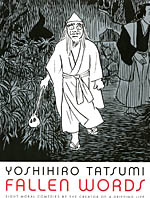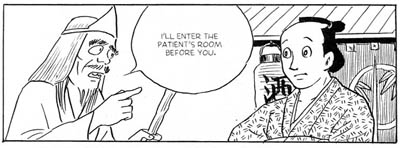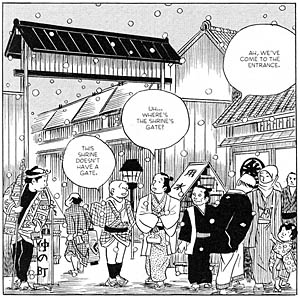 By Yoshihiro Tatsumi
By Yoshihiro Tatsumi
288 pages, black and white
Published by Drawn & Quarterly
Yoshihiro Tatsumi’s career as a manga creator is long and varied; originally known for helping create the "gekiga" alternative manga genre in the ’40s and ’50s, and then bursting back onto the scene a few years ago with his enthralling autobiography A Drifting Life. With Fallen Words, his new short story collection, Tatsumi addresses an old Japanese storytelling technique and group of long-standing stories (called rakugo) by shifting them from performance art into a comics page. And once again, Tatsumi shows the reader that he’s still got the skill and craft that’s made him an important craftsman of manga all these years.
Each short is short and mixes humor and drama; once you understand these were stories that were performed by storytellers for crowds, the overall rhythm and conversational mood of these pieces becomes much more clear and understandable. Even if you didn’t know this in advance, though, it would be easy to confuse these for Tatsumi’s older gekiga comics, with their offbeat and entertaining conclusions. Nothing is quite as simple as they’d initially seem, even though there’s a certain internal logic that runs through all of them.
 It’s "The God of Death" that I think sums up the entire Falling Words collection, both tonally and in terms of reader satisfaction. It starts out simply enough; a man and his wife are so down on their luck they can’t afford the three ryo it costs to pay their baby’s godparents in exchange for the baby being given a name. At the end of his wits, he feels that the God of Poverty is responsible, but from there gets sidetracked into thinking about the God of Death. And just then, the God of Death shows up and asks how he can help out. From there, the story sidetracks from a normal, every day story into one that’s a bit more off-beat. The God of Death tells the man how he can use his new ability to see the God of Death to help "heal" people who are sick, and how this ability both gives them lots of money but also moves them eventually into a new, bad situation. And then just when you think you know where things are going, one final glimmer of hope shows up, accompanied by a last second swerve.
It’s "The God of Death" that I think sums up the entire Falling Words collection, both tonally and in terms of reader satisfaction. It starts out simply enough; a man and his wife are so down on their luck they can’t afford the three ryo it costs to pay their baby’s godparents in exchange for the baby being given a name. At the end of his wits, he feels that the God of Poverty is responsible, but from there gets sidetracked into thinking about the God of Death. And just then, the God of Death shows up and asks how he can help out. From there, the story sidetracks from a normal, every day story into one that’s a bit more off-beat. The God of Death tells the man how he can use his new ability to see the God of Death to help "heal" people who are sick, and how this ability both gives them lots of money but also moves them eventually into a new, bad situation. And then just when you think you know where things are going, one final glimmer of hope shows up, accompanied by a last second swerve.
And to me, it’s that last second swerve that punctuates each of the pieces in Fallen Words. It’s not always a "ha ha, didn’t see that coming!" moment, but rather a sudden proclamation or final burst of dialogue that is clearly meant to both surprise and amuse the audience. It’s a storytelling punch line, that moment where you can almost see the performer letting that final piece out and into the listeners, followed by a mixture of laughter and applause. As a result we’ve got all different genres of stories in Fallen Words—a brothel employee listens to complaints of angry patrons, a father takes his annoying son with him on a shopping expedition, a poor family finds purse full of a fortune—but the overall pacing is the same. But while with other creators that recognizable format might grow old, in Fallen Words it actually heightens the experience; you find yourself eagerly awaiting that sudden shift and moment where you laugh along with Tatsumi.
 You may also find yourself noticing that there’s a certain class level that runs throughout Fallen Words. These rakugo stories are never about the already-wealthy or well to-do. It’s about people down on their luck, eking out an existence, definitely part of the lower class. You’ll start to recognize those tropes as Fallen Words moves from one setting to the next; the innkeeper who can’t afford to stay open, the patron who can’t pay his bills, and so on. It makes sense when you think about it; stories like these would probably be performed to those who didn’t have much money, who couldn’t go to high-society events. It’s a form of storytelling that is often used to entertain the masses, and here the audience can watch people just like them either succeed or fail, depending on how that final beat was to land. The cover describes the shorts as "moral comedies" and it’s easy to see why; perhaps once again because of their "meant for the broad public" nature, there’s a big push for working hard and not taking shortcuts, but interspersed with a good sense of humor.
You may also find yourself noticing that there’s a certain class level that runs throughout Fallen Words. These rakugo stories are never about the already-wealthy or well to-do. It’s about people down on their luck, eking out an existence, definitely part of the lower class. You’ll start to recognize those tropes as Fallen Words moves from one setting to the next; the innkeeper who can’t afford to stay open, the patron who can’t pay his bills, and so on. It makes sense when you think about it; stories like these would probably be performed to those who didn’t have much money, who couldn’t go to high-society events. It’s a form of storytelling that is often used to entertain the masses, and here the audience can watch people just like them either succeed or fail, depending on how that final beat was to land. The cover describes the shorts as "moral comedies" and it’s easy to see why; perhaps once again because of their "meant for the broad public" nature, there’s a big push for working hard and not taking shortcuts, but interspersed with a good sense of humor.
There’s a certain sameness in Tatsumi’s art for Fallen Words, although it’s hard to tell if that’s deliberate or not. There’s definitely a very distinct and often-used set of faces on these characters; most of them in particular look identical, although there are a few exceptions, especially stories with several main characters. It’s something that at first I found a little frustrating as I would start a new story and see another character that looked like the last story’s lead, but over time I grew to appreciate it. It felt almost like this was a deliberate choice on Tatsumi’s part; these are, after all, an attempt to shift a group of tales performed by storytellers onto the printed page. Having the characters look the same over and over again, in that light, is a decision that actually works rather well. We aren’t getting the literal storyteller performing in front of us, but through Tatsumi’s art we’re seeing those performers take the stage again and again. As with A Drifting Life I’m always enchanted by Tatsumi’s drawings of backgrounds, although here they’re far less frequently appearing, and slightly less detailed. If anything it reinforced my feeling that the sameness of the characters was a choice from Tatsumi, once again making us feel like we’re seeing this performed on the street, perhaps.
Tatsumi might be seventy-five years old, but Fallen Words is a strong reminder that he’s still an important creator in comics. With each new release I’m delighted to see how good he still is; the fact that he’s been able to change gears in recent years to shift to autobiography and now rakugo is all the more impressive. Whatever of Tatsumi’s is released next, there is no doubt in my mind that I’ll be buying it. Fallen Words is a bit different from his earlier works, but it’s just as entertaining.
Purchase Links: Amazon.com | Powell’s Books
